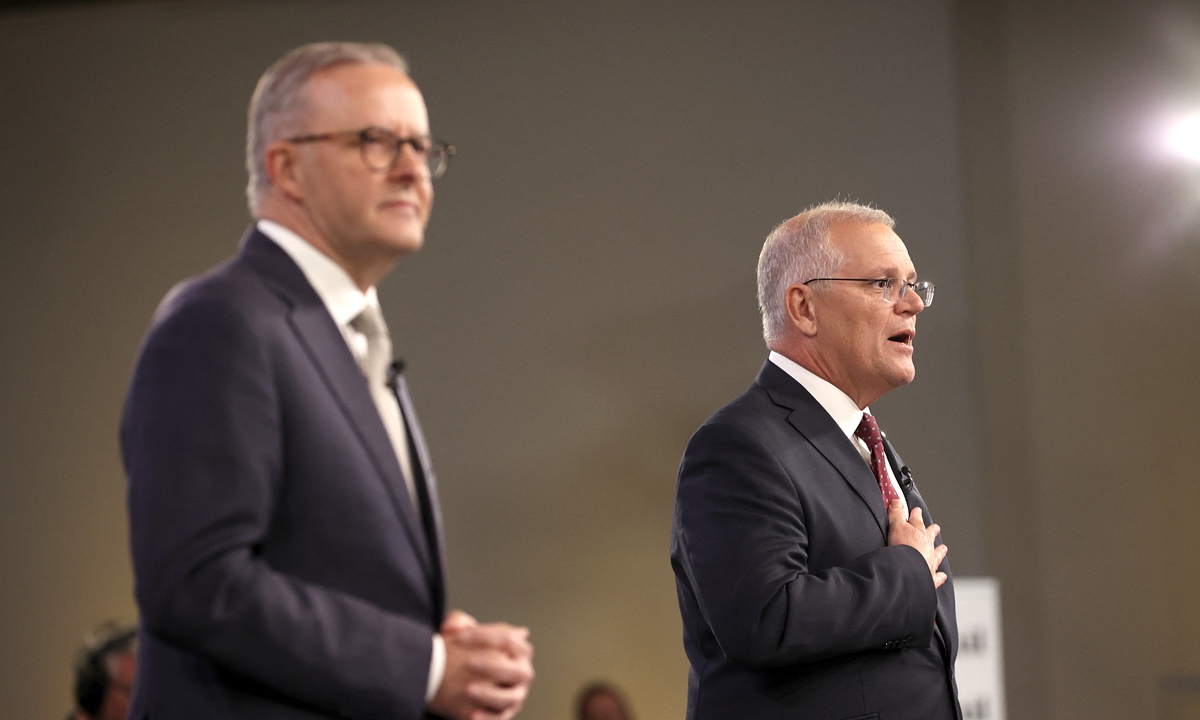
Leader of the Opposition Anthony Albanese (L) and Australian Prime Minister Scott Morrison attend the first leaders' debate of the 2022 federal election campaign at the Gabba on April 20, 2022 in Brisbane, Australia.
Wednesday witnessed the first leaders' debate of the 2022 Australian federal election between Prime Minister Scott Morrison and Labor leader Anthony Albanese. The one hour debate mainly focused on domestic issues and policies, but a testy moment occurred when the two candidates "clashed" on China-related topics. The moment was short but enough for media to make a fuss.
In the face of criticism from Labor, which argues that the recent security pact between China and the Solomon Islands is Australia's "worst foreign policy failure in the Pacific" since the end of World War II, Morrison said it wasn't Australia's fault, but China's, hinting the "China threat" in the region. Albanese, who also accused China of being "aggressive," dug out the deal of Port Darwin. "This government sat back and went missing while the Port of Darwin was sold," he said.
Compared with the Morrison administration, Labor's criticism of China was relatively low-key. But both sides played their anti-China cards in a high-profile manner during the TV debate. This indicates that "China-Australia ties will face big uncertainties no matter who comes to power," Chen Hong, director of the Australian Studies Center at East China Normal University, told Global Times.
The security agreement between China and the Solomon Islands is normal cooperation between two sovereign and independent countries on the basis of equality, mutual respect and mutual benefit. No third party has the right to interfere. The Darwin Port lease agreement is also a mutually beneficial business practice. It is irrelevant from any security or political calculation.
Yet thanks to the US' increasing influence in Australian politics, the Morrison administration has been sparing no efforts to hype the so-called China threat theory over the past years, misleading Australian society. The general election debate has brought such deceit to a new level.
Has China ever threatened Australia? This is not a real reason for Australia to turn anti-China. Why would China ever do so, as there is no fundamental conflict of interest between the two, no territorial disputes and no historical grudges?
Some observers keep saying that Australia's economy once expanded rapidly because it sold iron ore, wine, dairy and beef to China, and because an increasing number of Chinese people invest and study there. Apart from practical economic benefits, the China-Australia relationship had also played a positive role in one another's social and cultural development, according to Chen.
Yet some Australian politicians failed to see where their country's interests lie, and cut such interactions and connections with China. "The real failure is not Australia's foreign policy toward the Solomon Islands, but its China policy," Chen said. He added that it is because of Canberra's constant mistakes in its China policy that led to the current deadlock between the two countries.
The irony is it is not China, but the US, which has threatened Australia's sovereignty and independence. "The US is imposing its own strategy on Australia," Chen told Global Times.
Numerous examples can be cited. For instance, former president Barack Obama chided then Australian prime minister Malcolm Turnbull for not keeping him in the loop after learning about the lease of Port Darwin. "Let us know next time," Obama was quoted as warning Turnbull. Quite recently, before the agreement between China and the Solomon Islands was formally signed, Washington announced it would send Kurt Campbell, US national security council coordinator to the South Pacific country, in an apparent attempt to disrupt the deal.
US shadows are everywhere in Australia's diplomacy. In May 2020, then US secretary of state Mike Pompeo issued a blunt threat to "disconnect" Australia from its telecommunications, military and intelligence networks if any Australian government made an agreement with China deemed to endanger US "national security."
When Australian politicians are obsessed with playing the anti-China card and tying Australia to the US tightly, they are making a risky bet. The result could not only jeopardize ties with China, but Australia's interests.




